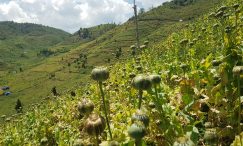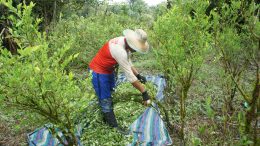María Alejandra Vélez and María Juliana Rubiano-Lizarazo of CESED reflect on challenges in implementing crop substitution in environmentally protected areas and indigenous reserves.

Colombian state reactions to peace: The legacies of the narcoguerrilla-narcoterrorist discourses
This Journal of Political Power article analyses the effect of the Colombian peace process on the discourse of ‘narco-guerillas’.

‘Everything peasants do is illegal’: Colombian coca growers’ everyday experiences of law enforcement and its impacts on state legitimacy
This Third World Quarterly article draws on coca farmer accounts to argue that if the state continues to wage war against the peasantry, it will hardly achieve effective governance of the coca frontier.

‘Erradicamos la coca, ¿y ahora qué?’ La sustitución desde las voces de los usuarios del PNIS en Tumaco
Con este especial, queremos ir más allá de los datos y cifras del incumplimiento del Programa Nacional Integral de Sustitución de cultivos de uso ilícito.

‘La Paz con hambre y bala está muy difícil.’ Informe de seguimiento a la implementación del PNIS
En este informe hacemos una evaluación a la implementación del Programa Nacional Integral de Sustitución de cultivos de uso ilícito.

Drugs, development and peace processes in Colombia
Podcast: Drugs & (dis)order researchers explore how illicit drugs have been approached within Colombia’s peace process.

Land formalization – The new magic bullet in counternarcotics? A case study of coca cultivation and tenure (in)formality from Colombia
This World Development article examines some of the causal mechanisms that underlie the relationship between land tenure and the cultivation of crops used for illicit drug production.

Fumigación: daños a la salud democrática
El informe tiene como objetivo central identificar las afectaciones que el programa de aspersiones aéreas con glifosato ha ocasiones sobre aspectos y dimensiones básicas de la democracia colombiana.

Pathways to opposing centralised and exclusionary drugs policy in Colombia
Six defining characteristics of the evolution of Colombia’s drugs policy and two possible entry point for policy influence with research.

An analysis of Colombia’s drug policy and actors
A closer look at the evolution of Colombian and international illicit drugs policies and actors.

International Journal of Drug Policy Special Issue: Drugs, conflict and development
Empirical research on the convergence of the drugs, development and peacebuilding policy fields.

The substitution program on trial: progress and setbacks of the peace agreement in the policy against illicit crops in Colombia
This paper examines the design and implementation of the Colombian national illicit crop substitution program that was included in the Peace Agreement.

‘Whatever we have, we owe it to coca’. Insights on armed conflict and the coca economy from Argelia, Colombia
This paper argues that rural development and engagement with local governance mechanisms in drug-producing regions are paramount to address effectively the problem of illicit crops.

Tough trade-offs Coca crops and agrarian alternatives in Colombia
This article compares coca with mainstream agrarian economies in Colombia. On the one hand, due to coca producers can escape from the ‘reproductive squeeze’ and extreme pattern of land concentration that affect other peasants; on the other, coca becomes an unending source of risk and distress. This contradiction puts peasants in front of very tough trade-offs, which in turn demand a careful reconsideration of what ‘alternative’ development can mean in the Colombian context.

Cocalero women and peace policies in Colombia
This article looks at the impact of the coca economy (considered a war economy) on women and argues that , policies pursuing a transition from war to peace, such as the ones that emerged from the 2016 Peace Agreement between the Colombian government and the FARC guerrilla, must incorporate a gender perspective in order to acknowledge the social progress that women can achieve in war scenarios.

Ecologies of drug war and more-than-human health: The case of a chemical at war with a plant
Drawing on an ecological approach, this article traces how the political-economy of drug wars are locally materialised in relation to health. In particular, it traces the different ways the chemical glyphosate used in aerial fumigation of coca crops in Colombia is materialised.

COVID-19 in Colombia’s borderlands
Podcast: Drugs & (dis)order researchers discuss how COVID-19 has affected communities and their research in Colombia’s borderlands.

Jessica: coca, estigmatización, violencia y desarrollo en colombia
Jessica es una líder social de Putumayo, un departamento en la frontera sur de Colombia. Este cómic fue creado por Inty Grillos, Colorbia. Leer comic

Voces desde los territorios fronterizos 2020
Los testimonios de este informe aportan ideas valiosas sobre cómo las drogas ilícitas –y las políticas de drogas– afectan las dinámicas de violencia, paz, pobreza, desarrollo, inseguridad y resiliencia.

Colombia: does peace still have a chance?
Francisco Gutierrez outlines the important role for international actors in helping turn the tide of violence in Colombia.

